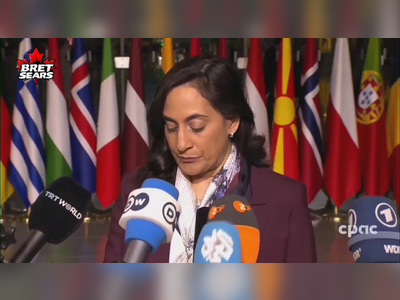Elon Musk Proposes Early Retirement of the International Space Station
Concerns over structural integrity of aging components prompt calls for accelerated decommissioning.
Elon Musk, the CEO of SpaceX, has suggested that the International Space Station (ISS) should be decommissioned sooner than planned due to safety concerns regarding its aging infrastructure.
The ISS, a significant platform for international cooperation in space research, has components dating back to its first assembly in 1998. Musk's recommendation to evacuate and deorbit the station within the next two years is based on the assertion that some of the station's parts have significantly deteriorated.
His comments follow a joint announcement involving NASA, Axiom Space, and SpaceX, which disclosed a delay in a planned mission to the ISS due to potential structural issues identified with a Russian module.
The Russian 'Swesda' module, over 20 years old, has exhibited unexplained pressure fluctuations, and the NASA has engaged with Roscosmos, the Russian space agency, to investigate these anomalies.
Former NASA engineer and startup founder Casey Handmer has publicly echoed concerns about the integrity of the ISS, stating that the frequency of leaks in critical segments of the Russian modules suggests a more profound problem concerning the station's structural integrity.
Handmer highlights that the aluminum used in constructing the ISS modules might be susceptible to catastrophic failure under multiple stressors.
He raised alarms that any significant breach could lead to a 'catastrophic failure,' affecting the safety of astronauts onboard.
Historical accounts indicate that the ISS has experienced several incidents involving air and fluid leaks, necessitating temporary closures between modules for safety reasons.
Currently, NASA's official plan is to operate the ISS until at least 2030. However, given the ongoing geopolitical situation, including Russia’s pledge to participate only until 2028, there is uncertainty surrounding future operations.
NASA is preparing for a controlled deorbit of the ISS, having contracted SpaceX to develop an unmanned 'Deorbit' spacecraft based on the Dragon capsule.
This spacecraft will aim to slow down the ISS before its re-entry into the Earth's atmosphere, where it is expected to mostly disintegrate.
Remaining debris is projected to land in uninhabited regions of the South Pacific to mitigate risks associated with uncontrolled crashes into populated areas.
To replace the ISS, various American startups, including Blue Origin led by Jeff Bezos, are planning initiatives like 'Orbital Reef.' Although SpaceX is not actively pursuing a new space station project, its launch technologies are considered crucial for future orbital developments.
While discussions around extending the operational life of the ISS continue, challenges remain due to its aging components and the complex international partnerships required to sustain such a program.
The ISS, a significant platform for international cooperation in space research, has components dating back to its first assembly in 1998. Musk's recommendation to evacuate and deorbit the station within the next two years is based on the assertion that some of the station's parts have significantly deteriorated.
His comments follow a joint announcement involving NASA, Axiom Space, and SpaceX, which disclosed a delay in a planned mission to the ISS due to potential structural issues identified with a Russian module.
The Russian 'Swesda' module, over 20 years old, has exhibited unexplained pressure fluctuations, and the NASA has engaged with Roscosmos, the Russian space agency, to investigate these anomalies.
Former NASA engineer and startup founder Casey Handmer has publicly echoed concerns about the integrity of the ISS, stating that the frequency of leaks in critical segments of the Russian modules suggests a more profound problem concerning the station's structural integrity.
Handmer highlights that the aluminum used in constructing the ISS modules might be susceptible to catastrophic failure under multiple stressors.
He raised alarms that any significant breach could lead to a 'catastrophic failure,' affecting the safety of astronauts onboard.
Historical accounts indicate that the ISS has experienced several incidents involving air and fluid leaks, necessitating temporary closures between modules for safety reasons.
Currently, NASA's official plan is to operate the ISS until at least 2030. However, given the ongoing geopolitical situation, including Russia’s pledge to participate only until 2028, there is uncertainty surrounding future operations.
NASA is preparing for a controlled deorbit of the ISS, having contracted SpaceX to develop an unmanned 'Deorbit' spacecraft based on the Dragon capsule.
This spacecraft will aim to slow down the ISS before its re-entry into the Earth's atmosphere, where it is expected to mostly disintegrate.
Remaining debris is projected to land in uninhabited regions of the South Pacific to mitigate risks associated with uncontrolled crashes into populated areas.
To replace the ISS, various American startups, including Blue Origin led by Jeff Bezos, are planning initiatives like 'Orbital Reef.' Although SpaceX is not actively pursuing a new space station project, its launch technologies are considered crucial for future orbital developments.
While discussions around extending the operational life of the ISS continue, challenges remain due to its aging components and the complex international partnerships required to sustain such a program.
AI Disclaimer: An advanced artificial intelligence (AI) system generated the content of this page on its own. This innovative technology conducts extensive research from a variety of reliable sources, performs rigorous fact-checking and verification, cleans up and balances biased or manipulated content, and presents a minimal factual summary that is just enough yet essential for you to function as an informed and educated citizen. Please keep in mind, however, that this system is an evolving technology, and as a result, the article may contain accidental inaccuracies or errors. We urge you to help us improve our site by reporting any inaccuracies you find using the "Contact Us" link at the bottom of this page. Your helpful feedback helps us improve our system and deliver more precise content. When you find an article of interest here, please look for the full and extensive coverage of this topic in traditional news sources, as they are written by professional journalists that we try to support, not replace. We appreciate your understanding and assistance.










